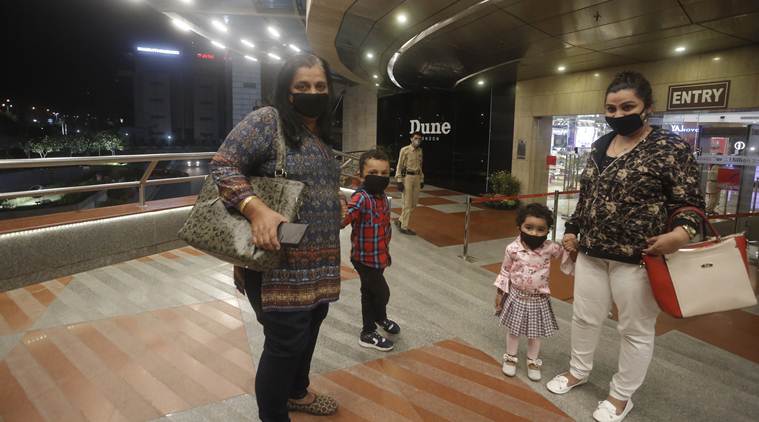 People take precautions at a Delhi mall. (Express photo)
People take precautions at a Delhi mall. (Express photo)
A DAY after the central government suspended all visas, barring select categories, and advised states to invoke provisions of the Epidemic Diseases Act, 1897, to check the spread of novel coronavirus (COVID-19) cases, the Delhi government on Thursday announced the closure of all schools, colleges and cinema halls in an attempt to enforce social distancing.
The Uttarakhand and Manipur governments also announced closure of schools till the end of the month. Earlier this week, educational institutions were closed in Kerala as well as Jammu and Kashmir (J&K). Cinema halls have also been closed in Kerala and some districts of J&K.
However, exams will be held as scheduled in all these states.
Express Explained: How home quarantine works
Meanwhile, the Union Health Ministry said the number of active cases has risen to 74, with 14 fresh cases — nine in Maharashtra, two in Uttar Pradesh, one each in Delhi, Ladakh and Andhra Pradesh. Some of these cases were reported by the state health authorities on Wednesday.
Kerala tops the list with 20 cases so far (three were discharged last month), followed by 14 in Haryana, 11 each in Maharashtra and Uttar Pradesh, 6 in Delhi, 4 in Karnataka, 3 each in Ladakh and Rajasthan, 1 each in Telangana, Punjab, J&K, Tamil Nadu and Andhra Pradesh.
“Delhi govt has declared coronavirus an epidemic. We need to exercise abundant caution to contain the disease. All cinema halls, schools, colleges in Delhi will be shut until 31st March, but exams will continue as scheduled. People are advised to stay away from public gatherings,” Delhi Chief Minister Arvind Kejriwal tweeted.
Lav Agarwal, Joint Secretary, Health Ministry, said about 1,500 people across the country are currently under observation. He said one lakh testing kits are currently available, and more have been ordered. Saying that India has not shown any significant community transmission so far, he said what has been seen instead is “local transmission within the community”. Allaying fears about testing capacity, Dr R R Gangakhedkar, head, division of epidemiology and communicable diseases, Indian Council of Medical Research, said: “At capacity, the National Institute of Virology alone can do 2,500 tests per day. So far, we have done only about 6,000 in the entire country.”
He said while the Lopinavir/ Ritonavir combination, usually a second line HIV medication, had been used for two patients, it was too early for results. The small sample size would mean that the results would not be scientifically significant, he said. “We would rather look at the results of the 199-person trial in China,” he said.
He also advised caution on reports of the virus weakening with rising temperature. “There is no evidence of that. Intuitive thinking tells you that the flu is not common in summer season, but we have no evidence that heat kills this virus. So we should be cautious and not get complacent or hope that the environment will help us tackle the disease,” said the senior scientist.